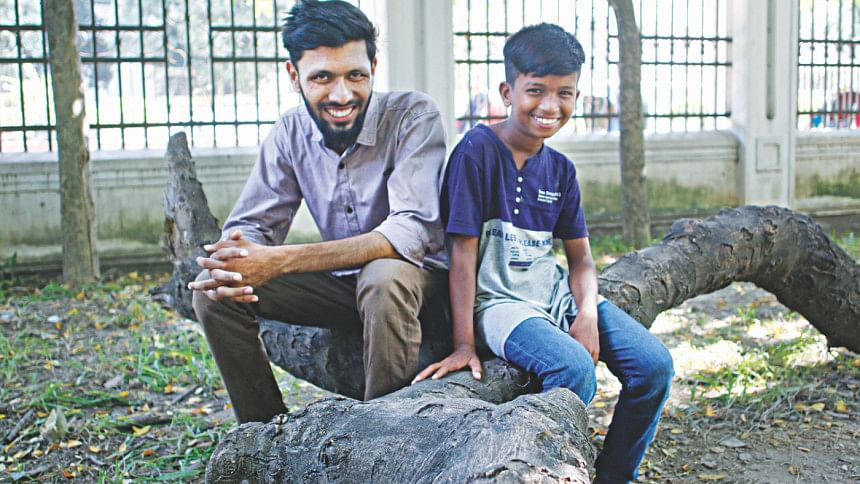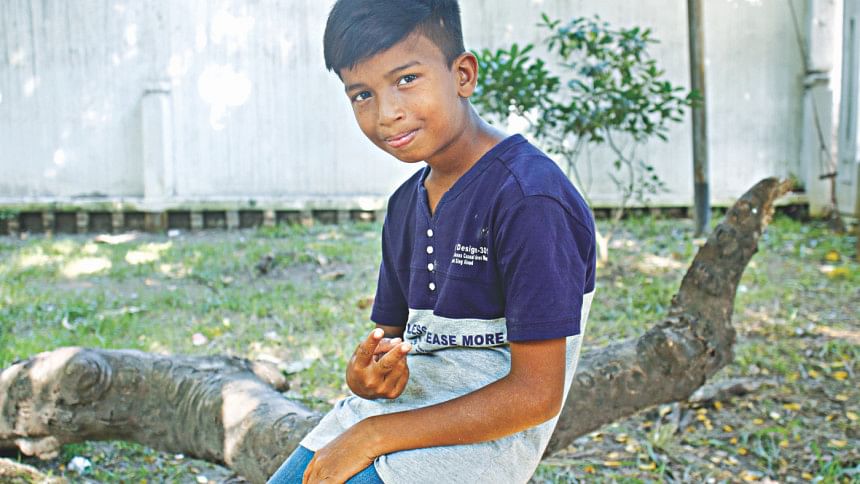Rana The Dhakaiya Gully Boy

While waiting in front of the central library of the University of Dhaka, a small crowd drew my attention. I was trying to see what was happening when, within seconds, a group of students surrounded a young boy to take selfies. That young boy turned out to be the latest social media sensation—the “Dhakaiya Gully Boy”. At that moment, I realised that 10-year-old Rana Mridha had successfully been able to attract attention to the plight of thousands of underprivileged children like him who roam Dhaka’s streets.
People used to wave him away when he knocked on car windows to sell flowers. Today, people are shaking hands and taking selfies with him to post on their social media accounts. Rana’s life changed when his outstanding talent in hip-hop, the lyrics of which criticised the government and civil society’s failure to address the basic needs of thousands of underprivileged children in Dhaka’s streets, went viral on social media. His moniker comes from the 2019 Bollywood film about an aspiring street rapper, a.k.a “Gully Boy”, from Dharavi, Mumbai.
Like many other children who roam the streets of Dhaka during the day, Rana lives with his mother, brother, and a niece at East Rasulpur in Kamrangirchar. Rana’s father lives in their village home in Faridpur, where he makes polo (a kind of fishing tool made from bamboo) for a living. Rana was forced to stop his studies in the first grade, as his mother, who worked as domestic help, was unable to pay his tuition fees. He has been on the roads since then, trying to earn some money to support his family.
“I used to sell flowers in the Dhaka University area. Every day, I would buy roses worth Tk 100 from Shahbagh and sell those for around Tk 500. I would hand over the money I earned every day to my mother,” says Rana. When asked how he learned rap songs, Rana says there is a dance club in his area where young boys and girls learned to dance to hip-hop music. “I loved watching them dance to that rhythm and music. In a few days, I was able to memorise the song while watching them dance,” he adds.
That song changed his life.
Those who have watched the Dhakaiya Gully Boy videos already know that Rana was trained and groomed by Mahmud Hasan Tabib, a fourth-year student of the Department of Arabic Language and Literature at the University of Dhaka (DU). Rana met Tabib in front of DU’s Salimullah Muslim Hall (popularly known as SM Hall) of the University of Dhaka while selling flowers there earlier this year. Rana told Tabib he wished to take a ride on his motorbike. Taking him on a ride, Tabib asked him what his talents were. Rana sang a hip-hop song of the Uptown Lokolz band. Tabib, amazed at his performance and after hearing stories of Rana’s life, decided he wanted to do something for underprivileged children like Rana.

Tabib, who has been writing hip-hop songs since his school days, said he had always been interested in the stories of Dhaka’s streets. But he hadn’t been able to find a character through whom he could bring these untold and unheard stories to life. “I’m very fond of poetry and my first book of poems, published during my intermediate exams, became a bestseller for that publication. I then realised that since hip-hop is basically poetry with music composition, I can experiment with this. When I met Rana, I realised that I can implement my plan for storytelling through a real character like him. I kept him as the subject of the story and bringing in other realities of life on the streets, I wrote my first song,” says Tabib.
Tabib took only one day to write the song and Rana, who had never finished the first grade, took only two days to memorise the lyrics. Tabib composed the music and recorded Rana’s vocals in his amateur studio—basically a computer, a microphone, and headphones. Later, with the help of a friend who did the videography, Tabib completed the music video and posted it on YouTube (with 1.1 million views and counting). The next two Dhakaiya Gully Boy videos got 7.7 million and 5.3 million views respectively. These videos were shared thousands of times by netizens, many of whom said that these were not mere song lyrics but usually unheard words of protest by underprivileged children like Rana. The team of Rana, Tabib, and his friend Rayhan (who shot the videos) have already earned around USD 1,700 from these videos. Tabib says that a portion of this money will be spent on Rana’s studies and the rest, on their next music videos. “A few brands have offered to sponsor our videos but we refused because we don’t want to commercialise this spirit and we still have the ability to produce our own videos. Our intention was that people talk about the issues and the government take steps to address the problems.”
Tabib and his friends are trying to get Rana admitted to a school in Azimpur. Since it is now the middle of the school year, Rana is now relearning his letters as he has been out of school for years. Popular local YouTuber Tawhid Afridi has pledged to cover Rana’s school expenses.
Tabib, on the other hand, has received an invitation from ICT State Minister Zunaid Ahmed Palak for his outstanding efforts in bringing out the voices of street children. “The state minister has appreciated our work and he assured us that he will try to do something in this regard. We are very hopeful about this matter. I believe that the initiative must come from the government. Because randomly giving five to 10 taka to children begging or working on the streets does nothing to solve the issue overall. Rather, we need to do something sustainable. The government can create a fund for them and the officials who will be taking care of the fund must be accountable for their actions so that no corruption can take place. If a check and balance can be ensured, this can bring some change,” he adds.
This is not an idle concern for Tabib, who has some complaints with the mushrooming number and activities of organisations in Dhaka that are purportedly helping underprivileged children. “I welcome their efforts in choosing to work for the underprivileged. But, at the same time, there must be monitoring and surveillance of their activities and how they are collecting and spending funds,” he says.
Tabib shared an incident in this regard. One of the many organisations working for street children invited Rana and Tabib to attend a programme of theirs to perform a song, in exchange for a good amount of money. The purpose of the programme was ostensibly to distribute food to street children. “When I proposed to them that I would prepare the lyrics and music but I want to introduce another boy like Rana so that he too gets exposure, the organisation disagreed. They wanted Rana because he was famous on social media. I realised that their motive was not to work for the betterment of the street children but rather to show off and gain publicity. The money they offered us was way higher than the amount they were going to spend on distributing food to the children. There must be a check and balance,” he states.
Rana and Tabib are now waiting for the government to take some initiatives to the problems they relayed through their songs. In their third music video, they called for some solutions for the numerous problems the street children face every day in terms of food, shelter, education, and healthcare. They are looking to see some change before they embark on Gully Boy Part-4.

 For all latest news, follow The Daily Star's Google News channel.
For all latest news, follow The Daily Star's Google News channel. 



Comments